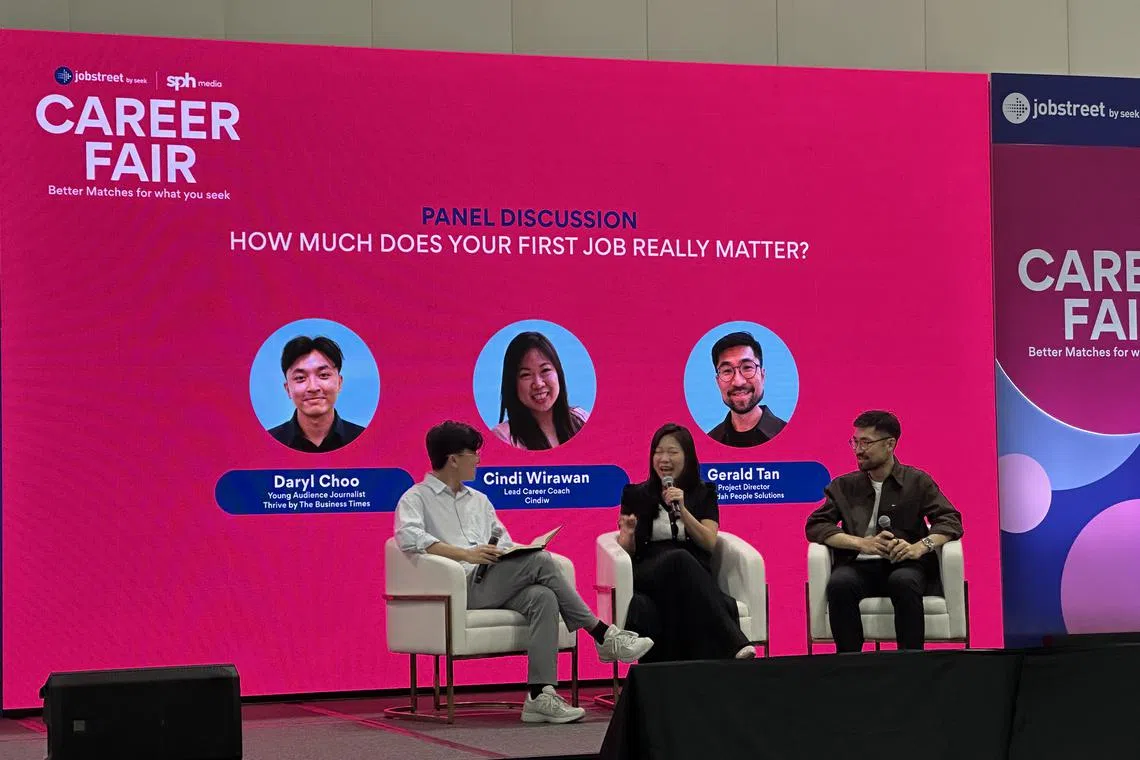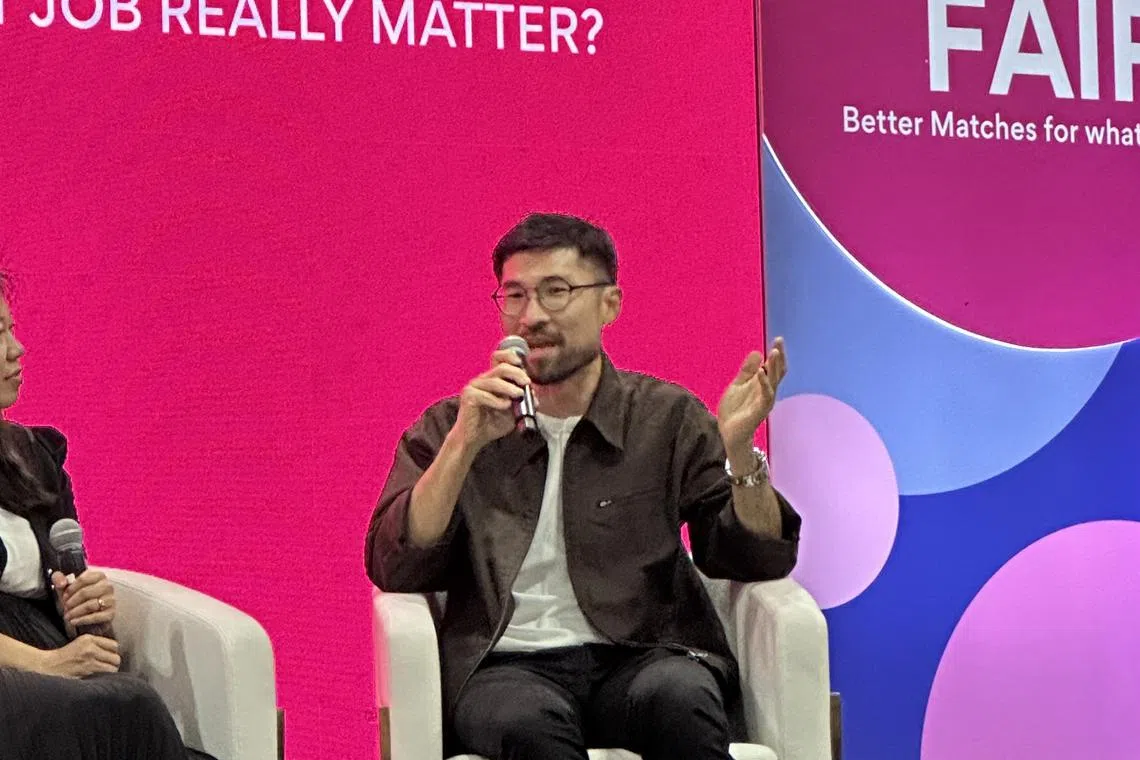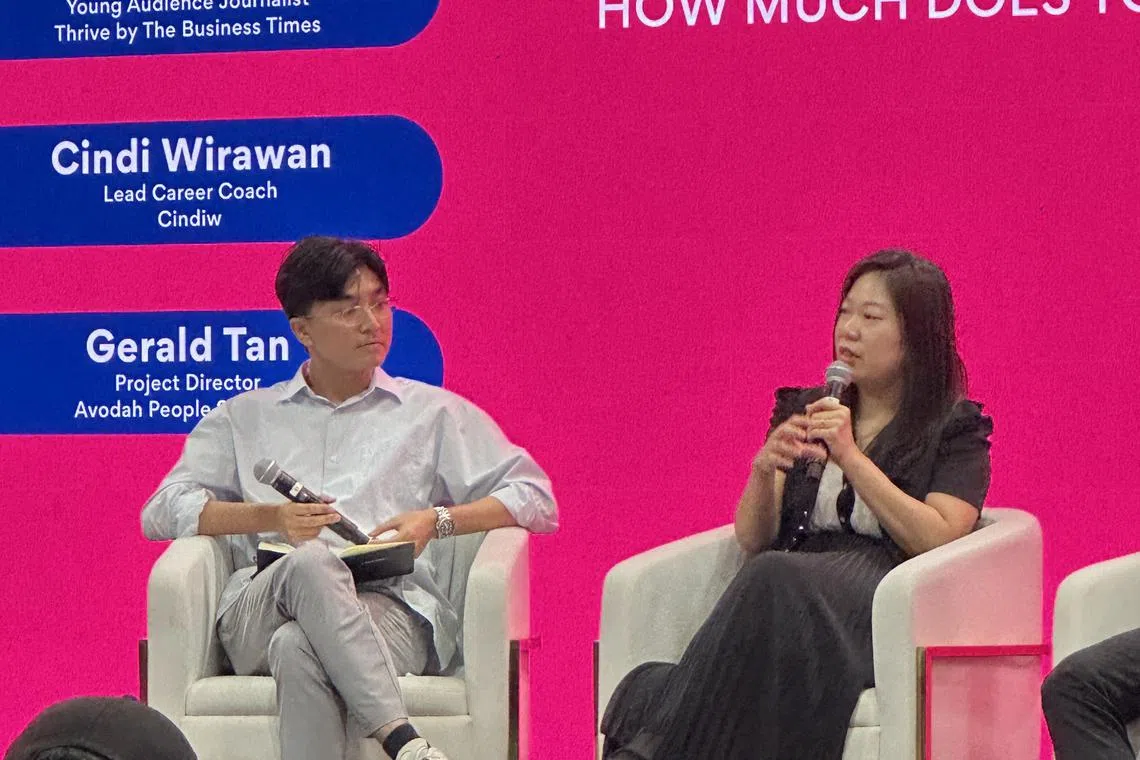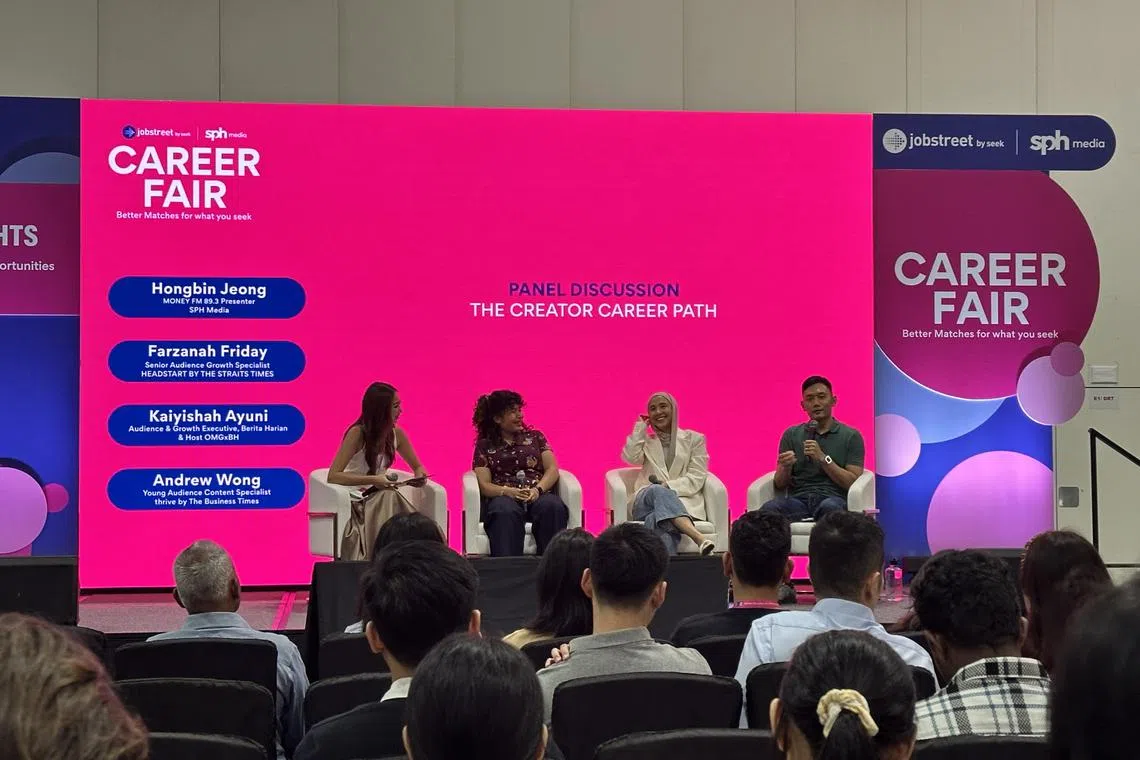Gen Zs, forget instant gratification – career growth takes time: panellists
Young workers may crave quick wins but patience is key, stress panellists at a discussion moderated by thrive, The Business Times’ young audience initiative

Straight to your inbox. Money, career and life hacks to help young adults stay ahead.
[SINGAPORE] Fresh graduates should resist the urge to quit at the first signs of discomfort and instead give themselves time to grow into their roles, said panellists during a discussion on early careers last Saturday (Aug 30).
“Sometimes Gen Zs... want instant gratification, especially in their first job,” said panellist Cindi Wirawan, lead career coach at Cindiw.
But growth takes time – and so does earning the trust of employers before new joiners are given greater responsibilities, she added.
The panel discussion was one of the career insights dialogues at the Career Fair by Jobstreet by Seek and SPH Media held at Marina Bay Sands Expo and Convention Centre.

On the panel, Wirawan was joined by Gerald Tan, projects director at Avodah People Solutions.
“Employers actually cut fresh graduates a lot of slack,” Tan said. Managers generally do not expect fresh graduates to know it all upon entering the workforce, he added.
Navigate Asia in
a new global order
Get the insights delivered to your inbox.
“I would say that you need at least nine months to figure out whether it’s the right place for you,” Tan advised. This was in response to a question posed by a member of the audience who asked whether he should leave his job after being there for four months.
“We quickly fall into assumptions that things are bad. When things are just a bit tougher, we think that it’s toxic,” Tan said.
When young professionals encounter challenges, they should seek external perspectives to better assess the severity of the situation, and whether it truly warrants a resignation, he advised.
“Give yourself some time,” Tan said. But if your mental health is affected, he stressed, that should always be prioritised first.
Wirawan concurred, advising the audience to always secure a job before resigning, unless the current role is taking a toll on one’s mental or physical health.
Taking up traineeships
Daryl Choo, thrive’s young audience journalist and the moderator of the panel discussion, asked for the panellists’ take on graduate traineeships.
“If you are a graduate and you have options, just take the permanent option. Don’t go for the traineeship,” Avodah People Solutions’ Tan said.

However, for those who are unable to find full-time employment, traineeships are still a good place to gain experience and discover more about oneself, he added.
“I’ve heard success stories of traineeships. I heard many horror stories of traineeships as well,” he noted.
Many enter traineeships hoping for a conversion to full-time employment, but not all employers may be able to guarantee that, Tan said.
Fresh graduates choosing between traineeships should clarify with their prospective employers beforehand on the long-term prospects when programmes end before they make a decision, he advised.
Nonetheless, fresh graduates can still reap benefits from these traineeships, such as building networks, gaining industry exposure and building one’s resume, Wirawan noted.
The weight of one’s first pay cheque
Your first pay does not always set the stage for the rest of your career, Wirawan said.
“So, case in point… I actually took a huge pay cut and I accepted a S$20 per hour job, just so that I could get into the career coaching industry,” she shared.
While your first pay does set the base for those who stick to the same role or function, this may not apply to those who pivot to different industries, Wirawan noted.

“It should not matter,” Tan said. “It should be benchmarked against your responsibilities. It should not be benchmarked against what you (had) last drawn.”
But there is also the trap of raising your salary too fast early in your career, Tan cautioned.
“I think all of us want more salary, right? That’s normal human behaviour, but there is a threshold, a point where it’s too much,” he said.
Employers are looking to hire talent at a certain price point. So, if one’s expected salary rises too high, they risk being seen as an expensive hire, Tan said.
He pointed out that early career professionals without a wealth of experience may find themselves in a tricky situation, where they are not able to justify their expected salary with relevant skills and experience.
“Salary increment should be in tandem with our experiences,” Tan noted. Consequently, as one’s professional identity grows, they should become more confident in justifying a higher expected salary.
Both panellists agreed that it is possible to hold off disclosing one’s previous pay slip to potential employers. But if jobseekers find themselves pushed to a corner, they could provide their salary range instead, Tan suggested.
Politely turn the conversation back to your new expected salary, and be prepared to back it with research and justification for the negotiated rate, he added.
Building a career path
It is more important that young professionals find a nurturing working environment over picking the best job, Avodah People Solutions’ Tan said.
“It really depends on how much we make of that experience as well,” he added.
Wirawan said: “While your first job is quite important, it doesn’t determine the rest of your career.” Instead, your first job is a stepping stone, she noted.

First jobs do lay the foundation for the next steps, and could also further one’s interest within an industry.
At a separate panel discussion titled The Creator Career Path on Sunday, panellists shared their experiences as content creators within the media industry.
There are many pathways within the sector, said Andrew Wong, thrive’s young audience content specialist.
Early career professionals may start off as individual contributors, but could also move on to managerial roles – which often requires more people skills too, he added.
Wong described himself as a “corporate creator”, who has the opportunity to create engaging content within a professional setting. “We get the benefit of doing this as a day job, but we do something fun. So I think that’s a nice middle ground,” he shared.
To keep up to date on future events on navigating money, career and life as young adults, subscribe to thrive’s free newsletter or follow thrive on TikTok and Instagram. thrive is the young audience initiative of The Business Times.
Decoding Asia newsletter: your guide to navigating Asia in a new global order. Sign up here to get Decoding Asia newsletter. Delivered to your inbox. Free.
Copyright SPH Media. All rights reserved.


